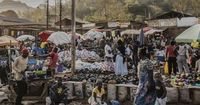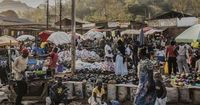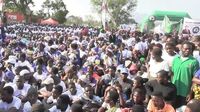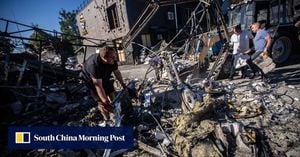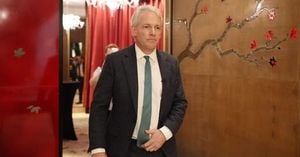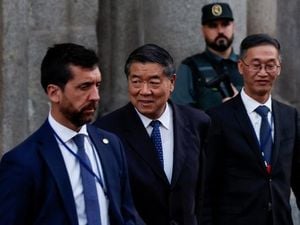Malawi, a nation of 21 million nestled in southern Africa, finds itself at a pivotal moment as voters prepare to head to the polls for a presidential election on Tuesday, September 16, 2025. The stakes could hardly be higher: the country is mired in an economic crisis marked by soaring inflation, food and fuel shortages, and a population weary from years of hardship. The contest is fierce, the memories of a controversial election not long ago still fresh—and the hope for a better future hangs in the balance.
The two main contenders are familiar faces, each representing starkly different visions for Malawi’s future. Incumbent President Lazarus Chakwera, aged 70 and a former theology instructor, is seeking a second term as the candidate of the Malawi Congress Party. His main challenger is Peter Mutharika, now 85, of the Democratic Progressive Party, who previously led the country from 2014 to 2020. Also in the running are 15 other presidential hopefuls, including former president Joyce Banda. Alongside the presidential vote, Malawians will elect lawmakers to Parliament and more than 500 local council members, making this a comprehensive test of the country’s democratic machinery.
The backdrop to this election is grim. According to the Associated Press, Malawi’s economy has been in freefall, with inflation skyrocketing from around 8% in 2020 to 27% under Chakwera’s administration. The cost of living has surged, and shortages of essentials like fuel and sugar have become commonplace. The agricultural sector, which sustains over 80% of the population—most of whom live in rural areas and rely on small-scale farming—has been battered by natural disasters. Cyclone Freddy in 2023 and an El Niño-driven drought in 2024 devastated crops, further exacerbating food insecurity. Tobacco remains the country’s biggest export, but even this mainstay has struggled to offset the broader economic woes.
The mood among Malawians has shifted dramatically since Chakwera’s first victory. Five years ago, his rise to power was buoyed by months of street protests and a widespread yearning for change. But after a tumultuous half-decade, many voters now express frustration and disappointment. Political analyst Boniface Dulani summed up the sentiment, telling AP: “Malawians are weary. They want results, not just rhetoric. And this election is a mirror of that frustration.”
The path to this election has been anything but smooth. The 2019 presidential vote, initially won by Mutharika, was marred by widespread irregularities—so much so that Malawi’s highest court annulled the results and ordered a fresh election. The court cited ballot tampering and even the use of Tipp-Ex correction fluid to alter results, a scandal that rocked the nation. The subsequent 2020 re-run, which Chakwera won, was hailed as a democratic milestone: it was the first time in Malawi’s history that a presidential result was overturned by judicial order. The fallout from that episode still reverberates, with trust in public institutions shaken and the electoral process under intense scrutiny.
The election law itself has changed as a direct result of that crisis. Now, for a candidate to win outright, they must secure more than 50% of the vote—a so-called 50%+1 rule. Analysts, including Dulani, believe it’s likely that no one will reach this threshold in the first round, setting the stage for a runoff between Chakwera and Mutharika.
Mutharika’s campaign has leaned heavily on nostalgia and promises of stability. He has accused Chakwera of “wrecking the economy and mismanaging key sectors,” as reported by AP. His supporters, particularly in rural and informal communities, echo these grievances. Eliza Justin, a 34-year-old market trader in Lilongwe, told AP, “At the time Peter Mutharika was in power, he reduced the price of fertilizers so everyone had the opportunity to farm. People were able to sell and buy food. This empowered people to have what they wanted. But this is not the case now, because people are scrambling to buy maize.”
Mutharika’s age has become a talking point—if elected, he would be 90 by the end of his term. He has also faced criticism for choosing as his running mate the former head of the electoral body that oversaw the canceled 2019 vote, raising questions about the impartiality of the process. Still, Mutharika’s message of “trusted leadership” resonates with many who feel let down by the current administration.
Chakwera, for his part, has been more visible on the campaign trail. Yet he faces the burden of an economy many describe as being “in freefall.” The tragic death of Vice President Saulos Chilima in a military plane crash last June—preceded by reports of a fallout between the two leaders—has further complicated Chakwera’s standing. Chilima, who was especially popular among young Malawians, was seen as a beacon of hope and a likely future president.
Some Chakwera supporters, however, insist that turning back to Mutharika would be a step backward. Aubrey Kachiwala, a taxi business owner, told AP, “We’re looking forward, not backward.” For these voters, the future lies in reform and continuity, not a return to the past.
The Malawi Electoral Commission, still under a cloud of skepticism from the 2019 debacle, is bracing for heightened scrutiny. The stakes are high—not just for the candidates, but for the credibility of Malawi’s democracy. The need for a fair, transparent, and peaceful election is paramount, especially given the country’s recent history.
Underlying all the political maneuvering are the daily struggles of ordinary Malawians. The cost of food and fertilizer—vital for a nation so dependent on agriculture—is at the top of voters’ minds. As AP notes, the vast majority of Malawians live in rural areas and depend on the land for survival. The economic crisis has hit these communities hardest, fueling anger and a demand for change.
As the country prepares for Tuesday’s vote, the outcome remains uncertain. Will Malawians give Chakwera another chance to turn things around, or will they turn to Mutharika in hopes of recapturing better times? With a crowded field of candidates and the possibility of a runoff looming, the days ahead promise to be tense and consequential.
Whatever the result, this election will be a defining moment for Malawi—a test of its institutions, its leaders, and the resilience of its people.
